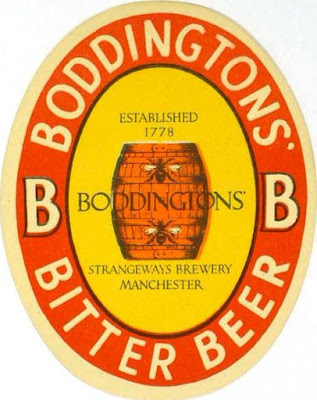Unfortunately, the information is patchy. For the 1970s, only the grower in listed. No harvest year (mostly) and no variety. About the only thing I know for certain is that all the hops were English. I suspect that at least some came from Kent, one of the growers being Neame.
The information for the 1980s is much better, mostly including both the harvest year and the variety. You'd be surprised how rare having all this useful data is. The presence of higher alpha varieties such as Bramling Cross and Northern Brewer could explain a drop in the hopping rate in 1984.
Was the appearance of Whitbread Goldings Varieties a result of an increased Whitbread influence?
One trend with the hops is clear. After 1982 more different types were used in each brew. Earlier, just two or three types were employed. Later, it was between five and seven types. That's an awful lot. Between two and four different hops was standard. Severn is really excessive.
Why have so many different hops? Usually, it's to even out the flavour from batch to batch. If you used a single type of Golding then switched to all Norther Brewer, there would be a sudden change in a beer's character.
| Boddington Bitter hops 1971 - 1987 | ||||||||
| Date | Year | hop 1 | hop 2 | hop 3 | hop 4 | hop 5 | hop 6 | hop 7 |
| 4th Jan | 1971 | English | English | |||||
| 28th Oct | 1974 | English | English | English | ||||
| 28th Apr | 1975 | English | English | English | ||||
| 29th Apr | 1976 | English | English | English | ||||
| 18th Apr | 1977 | English 1976 | English 1976 | English | ||||
| 30th Oct | 1978 | English | English | |||||
| 17th Oct | 1979 | English | English | English | ||||
| 31st Dec | 1979 | English | English | English | ||||
| 31st Mar | 1980 | English 1978 | English 1979 | English 1979 | ||||
| 4th Jan | 1982 | English 1980 | English 1980 | English 1980 | ||||
| 9th Jan | 1984 | Bramling Cross | Bramling Cross | Goldings | Goldings | Northern Brewer | ||
| 14th May | 1984 | English 1980 | English 1982 | English 1982 | English 1982 | English 1982 | ||
| 25th Mar | 1985 | Bramling Cross 1982 | Fuggles 1983 | Whitbread GV 1982 | Goldings 1982 | Goldings 1983 | ||
| 24th Feb | 1986 | Bramling Cross 1983 | Fuggles 1984 | Whitbread GV 1983 | Goldings 1984 | Northern Brewer 1982 | ||
| 29th Dec | 1987 | English | English | English | English | English | English | English |
| Sources: | ||||||||
| Boddington brewing records held at Manchester Central Library, document numbers M693/405/134, M693/405/135 and M693/405/136. | ||||||||
| Boddington brewing record held at the Science and Industry Museum, Manchester, document number 2006.4/Z/7/1 and 2006.4/Z/7/2. | ||||||||











































































4 comments:
Do you know how they would have decided on hop blends? Were they brewing test batches first until they had what they wanted? Or was it a lot more intuition and experience based?
Anonymous,
It would have been constantly evolving as stocks ran out and new hops arrived. Most likely, they'd never change more than one of the hops at a time.
I can’t add to the discussion of why Boddington’s Bitter changed for the worse, but I visited Manchester once or twice a year from 1972 until the late 80s, when my trips became more sporadic, and I drank a lot of Boddington’s during these visits. It looks as if some people had noticed a change in the beer during the late 1970s, but that wasn’t my experience: the beer seemed to me to be as good as ever until the first mouthful of my visit one year in the early 1980s, when it was clear that the beer was completely different (much less bitter and really pretty unmemorable). I’m pretty sure that it was in summer 1982 (it certainly wasn’t later than 1982), and on my previous visit (summer 1981), Boddington’s had been its old excellent self.
I'm a bit late to the party here, but there is an extremely long thread about Boddington's Bitter on the Home Brewing Uk forum. One contributor was insistent that they had spoken at length to former employees and stated that in the late 60s/early 70s Boddingtons used Goldings, Bramling Cross and Northern Brewer in the respective proportions of 50%, 40% and 10% by IBU contribution. I have devised a recipe using the information on here for 1971 and using medium malt extract,soft dark brown sugar and white cane sugar. I used Nottingham yeast and the attenuation was well into the 90s.OG 10355, final gravity 1003, IBU 30, colour 14 and ABV 4.3. I drank gallons of the stuff in Manchester between 1970 and 1975 and I can say with some confidence that the recipe is well nigh spot on.
If anyone wants it send me an email to jdwoodman@btinternet.com
Julian Woodman
Post a Comment